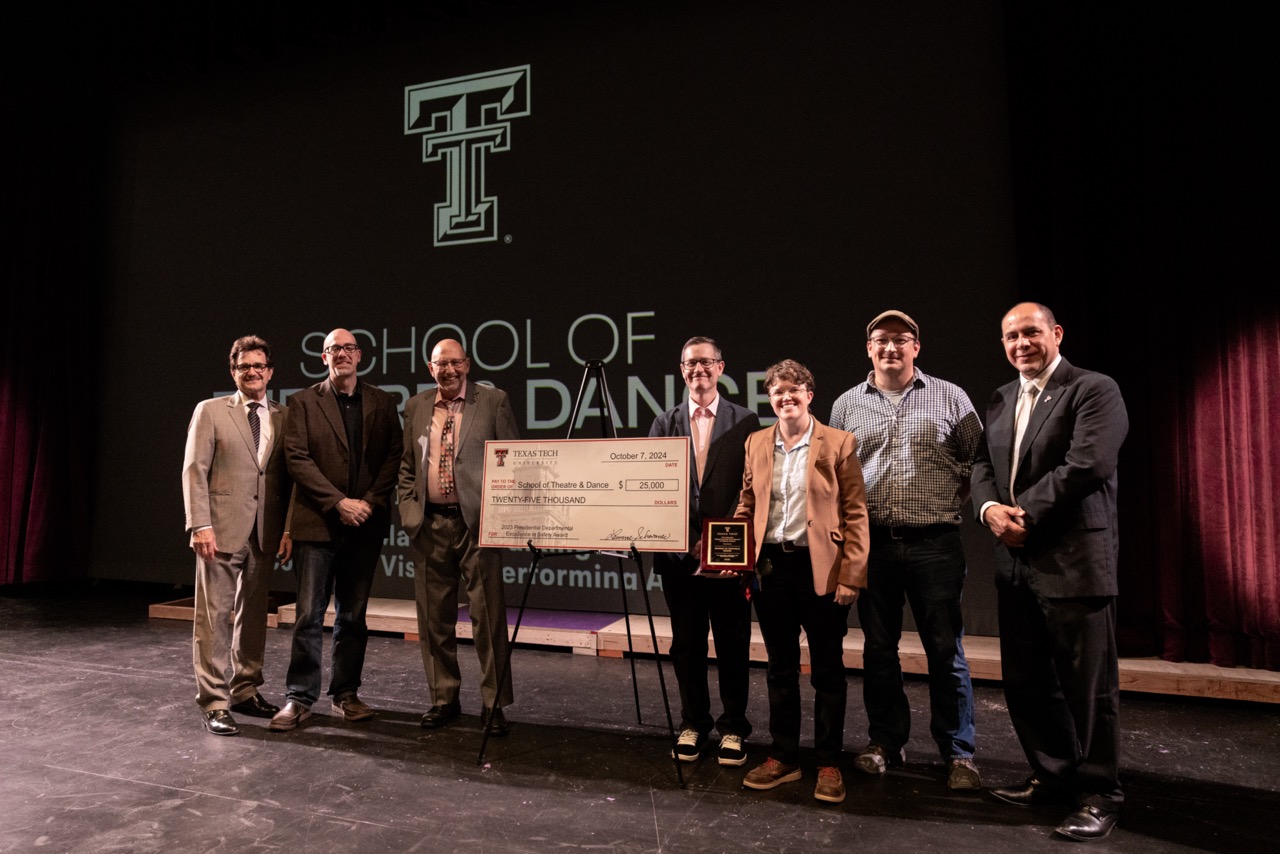
From the very origins of our program, our alumni built a strong base on fertile soil from which we have grown and prospered. Fortunately, these alums set a foundation that encouraged forward momentum years ago, a foundation upon which we proudly stand and perform.
On Monday, October 7th at 1:00, we received the Presidential Departmental Award for Excellence in Safety. I’m sure you’ll read about it, if not in this newsletter, on campus or college publications, so instead of again congratulating the authors of that application--Dr. Paul Reinsch, Assistant Professor Jared Roberts, and Facilities Manager, Natalie Mayo--I thought I might take a moment to reflect about how this ceremony was the catalyst for truly understanding the word progress, especially as it relates to our program.

Some of you may remember that the Maedgen Theatre building was the site of an accidental tragedy in 2001. President Schovenec recalled this incident in his remarks at the Award Ceremony before praising Theatre and Dance for its current awareness of best practices, especially exemplified by our attention to safety. And it got me thinking about how we have progressed in the last decade, beginning with the Board of Regents, in 2015, approving our designation as a School (instead of a department) in recognition our growth and accomplishments.
Certainly, our new theatre and dance complex is the most obvious external sign of progress, one that was generously supported by efforts coordinated by the Dean, President, and Chancellor at the time, and financially by many granting agencies. So is the immense growth of our number of faculty and staff and our rising student numbers.
As many of you know, Texas Tech is often recognized nationally as an ideal place to work, not only because of strong university and college leadership, but also because of excellent financial and emotional support; recognizable efforts towards a sustainable life/work balance; communally striving towards a shared vision of excellence; and maybe most importantly, bettered transparency and community building.
Surely that’s progress (of a sort anyway).
Another good indicator of progress may be our recent re-accreditation visit from the National Associations of Schools of Theatre (NAST) and Dance (NASD). Both yielded much more praise than criticism, with dance requiring a brief optional response and theatre, not even that. When the theatre program was accredited in 2012, NAST specified 32 items that had to be addressed before the organization granted us non-probationary status, the last (and most important) being the million-dollar stand-alone costume shop necessary to protect the safety of our students (who, as many of you remember, worked in a cavernous space under the stage).
That’s palpable, identifiable progress, sure. But let’s look for more.
The local and national awards earned by faculty, staff, and students alike certainly indicate excellence, which, of course, implies progress, but let’s reconsider the word as related to advancement—and this may be best illustrated by our Theatre and Dance in the Community course, where our students, all of them, spend a semester working with community partners, bringing performances to places that have few or no opportunities to experience the joy of art—beautifully exemplified by an entire season we spent performing at unconventional spaces all over Lubbock (a Nissan Dealership, the Equestrian Center, an art gallery). Or our partnership with the Burkhart Center, our experiential education programs (WildWind, Marfa Intensive, Tennessee Williams Institute, the International Dance and Parenting Network), our relationship with Flatlands Dance Company, our inclusion in the International Theatre Institute…but you know all of that.
Advancements in education, to be sure.
While these are bragging points, indeed, maybe to find the deep structure meaning, we need to turn to the idea of progress as enrichment, and that brings us to our students. These myriad accomplishments are nothing if we divorce them from the education of our community, so maybe the aspect of our School that should give us the most pride has to do with thinking of progress as a voyage, constantly unfolding, where the smartest artists/professors I know share ideas that continue to better and broaden our methods of education.
That’s smart, I know and yet another reason to be proud. But does it truly represent progress?
Maybe to fully understand the power of that word, as much as we may want to resist it, we need to return to the tragedy that occurred on our stage in 2001. While that incident will always be part of our story, and as we look forward to gathering alumni who represent the past, our history—especially those who studied under Ron Schulz— for a reunion this April, I am reminded first and foremost that the seeds of progress are always rooted in encouraging growth based on openly acknowledging what we’ve learned from the past, both those good memories and others less positive….
From the very origins of our program, our alumni built a strong base on fertile soil from which we have grown and prospered. Fortunately, these alums set a foundation that encouraged forward momentum years ago, a foundation upon which we proudly stand and perform. And that, somehow, takes us closer to the definition of progress for which I’m searching. It may seem paradoxical, but we can only move forward if we understand the strengths of the past.
Yes. That’s it. We’ve learned that we can only evolve if we know (and honor) where we began.
Now, that’s progress.
